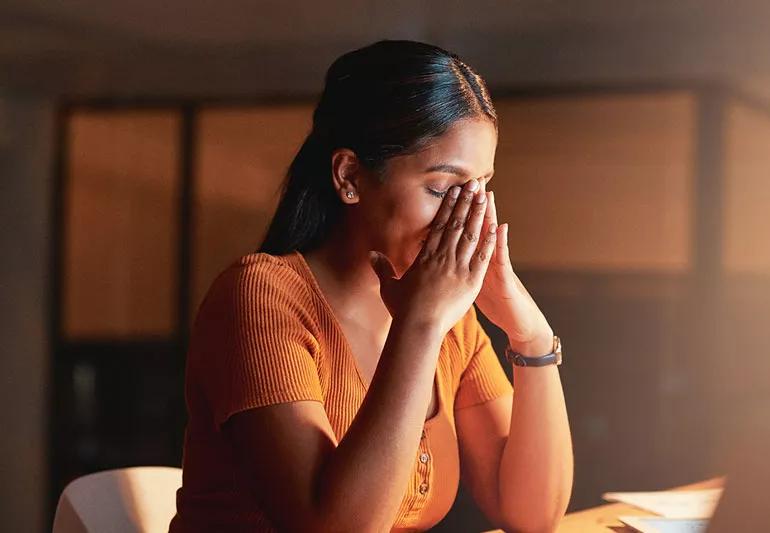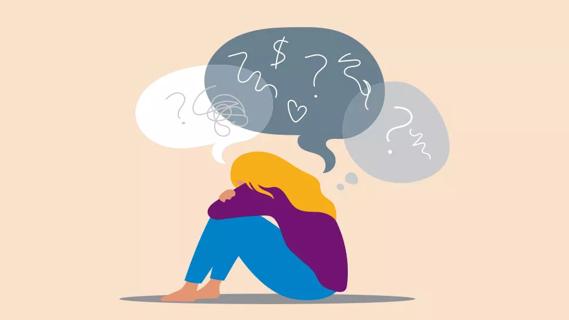Physical, mental and emotional responses are all relevant symptoms

We all feel fear, worry and stress at different moments in our lives. And sometimes, those feelings have the power to overwhelm us. But if that’s a common human condition, how do you know if you’re experiencing a healthy amount of anxiety or if you have an anxiety disorder? Where is the line?
Advertisement
Cleveland Clinic is a non-profit academic medical center. Advertising on our site helps support our mission. We do not endorse non-Cleveland Clinic products or services. Policy
Registered psychotherapist Natacha Duke, RP, says it all depends upon the frequency and extent of your anxiety.
We all feel some degree of anxiety when confronted with a threat — either real (like when a car swerves into your lane) or perceived (like a pending work meeting). Both situations can trigger adrenaline and your body’s fight-or-flight response, a physiological reaction that prepares you for survival.
Perceived threats can often feel like actual threats to our well-being, even though there may be no real harm. But whether these threats are perceived or not, any threat can feel real enough when they put us on edge and trigger our ability to feel anxious.
In any of these situations, you may notice several signs of anxiety. You can have a physical response, like:
Other symptoms that might surface include:
The symptoms of anxiety vary from person to person, and they grow in severity based on the cause of stress. But in most cases, anxiety occurs when a perceived threat triggers these symptoms for a prolonged period of time and disrupt your daily life. You can experience physical signs of anxiety or mental and emotional signs of anxiety, and sometimes, even all of them at once.
Advertisement
The key to understanding when anxiety needs to be managed is knowing how it shows up in your day-to-day life. Duke breaks anxiety down into common anxiety disorders, with varying symptoms:
Video content: This video is available to watch online.
View video online (https://cdnapisec.kaltura.com/p/2207941/sp/220794100/playManifest/entryId/1_dgx506xh/flavorId/1_5f3sgelj/format/url/protocol/https/a.mp4)
4 Warning Signs of Generalized Anxiety Disorder
There are a few factors that can help separate “normal” anxiety from clinical anxiety that would benefit from treatment, clarifies Duke. Factors to consider include:
“You really have to think about how much it affects your functioning,” Duke says. “You may be able to avoid some triggers, such as spiders. But if you are afraid of social situations, that’s harder to avoid and will likely impact your life much more.”
Advertisement
If you experience any symptoms of anxiety that consistently disrupt your life or make daily activities difficult, and it’s affecting your ability to function for up to six months, you should talk to a healthcare provider or therapist about the possibility that you may have an anxiety disorder.
If you decide to seek treatment, you may start with your primary care provider. Most doctors can help you get a good idea of how severe your anxiety is. They then may recommend medication, therapy or both.
Two types of medication may help manage your symptoms:
Your healthcare provider might also refer you to a psychiatrist, who can help manage your medication.
In many cases, working with a registered therapist can help you learn how to prevent anxiety in the first place. A tool they use is cognitive behavioral therapy, which helps you better understand your anxious moments and learn coping strategies for when anxiety strikes. You can often learn to manage anxiety with fewer than a dozen sessions. And Duke says combining medication and therapy is often highly effective at reducing anxiety.
Advertisement
If your anxiety is debilitating, talk with a healthcare provider about your specific needs. If you’re aware of the problems anxiety is causing, you can become equipped with the right management tools for your specific situation.
“You may not need medication or therapy for life,” says Duke. “But addressing the issue is important because sometimes anxiety can get worse over time if it’s not treated.”
Advertisement
Learn more about our editorial process.
Advertisement

Going home isn’t always easy, but there are ways to ease any stress you might feel

Managing stress can help you sleep more soundly

This fast-acting anxiety medication should never be taken with alcohol, despite what you may see on The White Lotus

Deep breathing, positive mantras and tackling negative thoughts can help get you out of your head and cool down your anxiety

Focusing on what you can see, feel, touch and hear can help you feel more present in the moment

Performance anxiety and stage fright are outsized stress responses that can creep up when you’re put on the spot

A healthy amount of anxiety can keep you safe from harm and motivate you to take action

Although different conditions, they can occur together or cause one another

Wearing a scarf, adjusting your outdoor activities and following your asthma treatment plan can help limit breathing problems

Your diet in the weeks, days and hours ahead of your race can power you to the finish line

When someone guilt trips you, they’re using emotionally manipulative behavior to try to get you to act a certain way